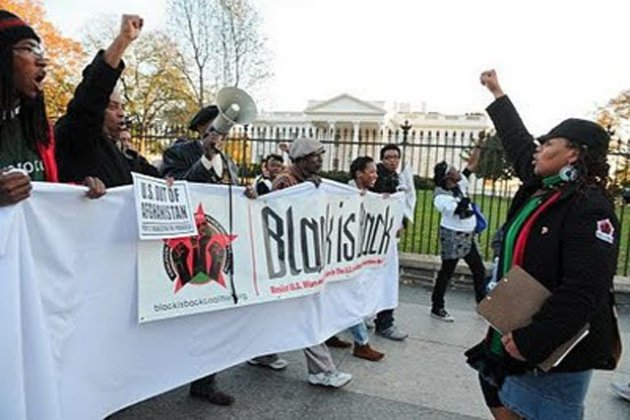 [Cross-Posted from The Washington Times by Paul A. Samakow. See comments below regarding the credibility of this article.]
[Cross-Posted from The Washington Times by Paul A. Samakow. See comments below regarding the credibility of this article.]
Thanks to almost zero media coverage, few of us know about a law passed this past March, severely limiting our right to protest. The silence may have been due to the lack of controversy in bringing the bill to law: Only three of our federal elected officials voted against the bill’s passage.
The First Amendment to our Constitution guarantees us the rights of free speech and assembly. A fundamental purpose of our free speech guarantee is to invite dispute. Protests can and have been the catalyst for positive change. Thus while we despise that protestors can burn our flag as protected political speech, and we hate that Neo-Nazis can march down our streets, we recognize the rights of these groups to do what they do and we send our troops across the world to fight for these rights.
Last year’s “occupy movement” scared the government. On March 8, President Obama signed a law that makes protesting more difficult and more criminal. The law is titled the Federal Restricted Buildings and Grounds Improvement Act, and it passed unanimously in the Senate and with only three “no” votes in the House. It was called the “Trespass Bill” by Congress and the “anti-Occupy law” by everyone else who commented.
The law “improves” public grounds by forcing people – protestors – elsewhere. It amends an older law that made it a federal crime to “willfully and knowingly” enter a restricted space. Now you will be found guilty of this offense if you simply “knowingly” enter a restricted area, even if you did not know it was illegal to do so. The Department of Homeland Security can designate an event as one of “national significance,” making protests or demonstrations near the event illegal.
The law makes it punishable by up to ten years in jail to protest anywhere the Secret Service “is or will be temporarily visiting,” or anywhere they might be guarding someone. Does the name Secret tell you anything about your chances of knowing where they are? The law allows for conviction if you are “disorderly or disruptive,” or if you “impede or disrupt the orderly conduct of Government business or official functions.” You can no longer heckle or “boo” at a political candidate’s speech, as that would be disruptive.
After you swallow all of this and correctly conclude that it is now very easy to be prosecuted for virtually any public protest, you should brace yourself and appreciate that it is even worse. Today, any event that is officially defined as a National Special Security Event has Secret Service protection. This can include sporting events and concerts.
The timing of the law was not coincidental. The bill was presented to the Senate, after House passage, on November 17, 2011, during an intense nationwide effort to stop the Occupy Wall Street protests. Two days before, hundreds of New York police conducted a raid on the demonstrators’ encampment in Zucotti Park, shutting it down and placing barricades.
This law chips away our First Amendment rights. Its motivation is 100 percent politically based, as it was designed to silence those who would protest around politicians giving speeches. Both Republicans and Democrats agreed they did not want hecklers at their rallies. If you want to protest a politician speaking to a crowd now, you can do so maybe a half mile or so away.
We used to have a right of access to streets, sidewalks, and public parks to engage in political discussion and protest. The government should be able to impose reasonable limits to ensure public order, but that power must have a limit; it must never be used to quell unpopular opinion or to discriminate against disfavored speakers. Protestors must be allowed to be in the same place at the same time as the speaker they oppose. The presence of a Secret Service Agent (remember, how do we know they are there?) should not prevent us from lawfully, non-violently organizing and demonstrating against a cause or a speaker we disfavor.
Write to Congress. Protest this anti-protest law.

Bill number? Public Law citation? This is supposedly reprinted from the (not credible) Washington Times. If we’re to believe it and act on it, a citation to the actual law would help a lot.
Its HR 347. Here is the bill in the Library of Congress records page: http://thomas.loc.gov/cgi-bin/query/z?c112:H.R.347:/
And you are right about the Washington Times. It isn’t a great paper…pretty trashy right wing paper at that with origins in the Unification Church. Its still a relevant article for discussion.
It was not the Washington Times, it was a “community contribution page” that uses the Washington Times name but there is no editing. So it’s basically another opinion/blog page that uses the Washington Times name.
Not that the bill didn’t happen, but the way it is being “reported” isn’t necessarily vetted as though a real journalist would be required to do.
It’s about balance, not creating fear. It’s ok to have an opinion, but don’t post that it came from a source that others might deem credible when, in fact, it did not.